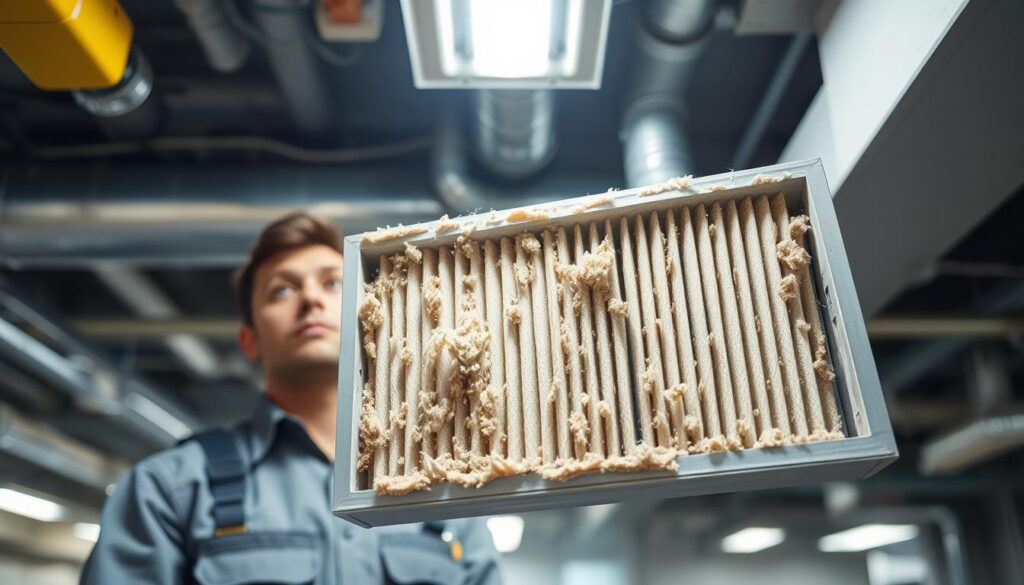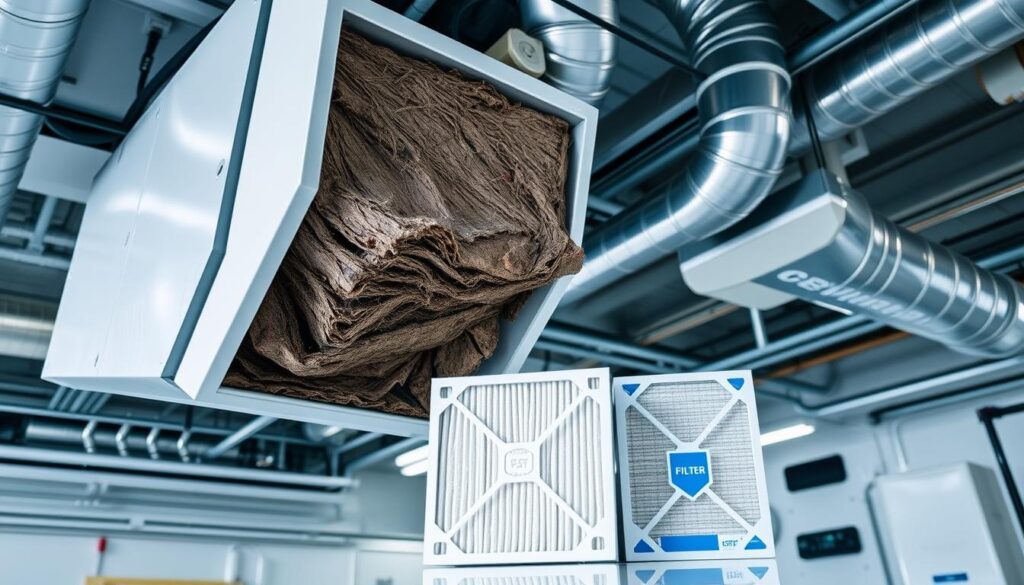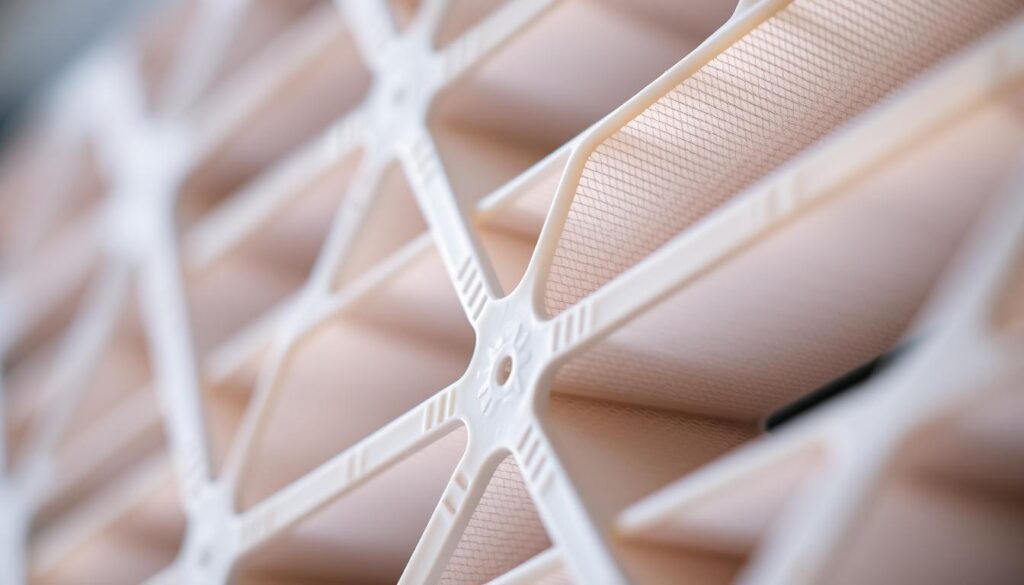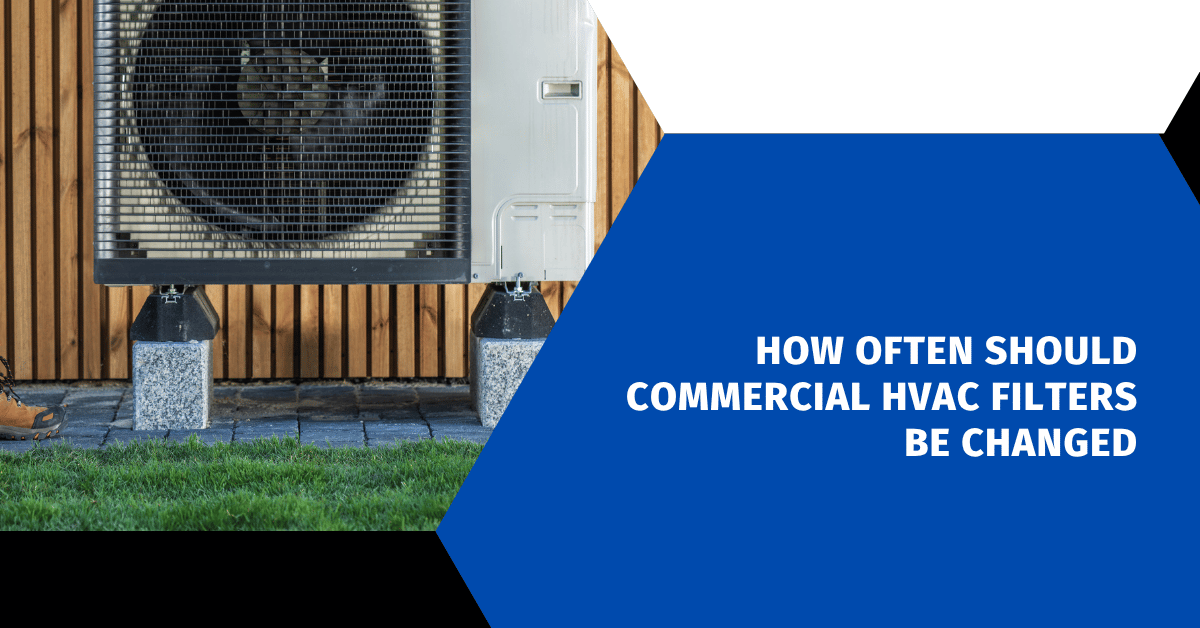Affiliate Disclosure
HVAC Guide Guys is a participant in the Amazon Services LLC Associates Program, an affiliate advertising program designed to provide a means for sites to earn advertising fees by advertising and linking to Amazon.
How Often Should Commercial HVAC Filters Be Changed? Ever wondered why your commercial building’s air quality is off, even with a pricey HVAC system? The answer might be in knowing when to change commercial HVAC filters.

Commercial HVAC systems handle a lot more air than home systems. They deal with a lot of dirt, dust, and pollutants. So, changing filters often is key for them to work well.
Keeping your HVAC filters clean is more than just for air quality. It’s about keeping your whole building healthy. Knowing when to change commercial HVAC filters means you’re looking out for your system’s life, energy use, and employee health.
Key Takeaways
- Commercial HVAC systems need filters changed more often than home systems
- Regular filter care affects air quality and system performance
- How often to change filters depends on many environmental factors
- Ignoring filter changes can raise energy costs
- Getting professional checks helps find the best filter change times
Table of Contents
Understanding Commercial HVAC Filter Basics
Knowing how commercial air filters work is key to keeping the air clean inside. Your building’s air filters help keep people and equipment safe from harmful particles in the air.
Types of Commercial HVAC Filters
Commercial HVAC systems use different filters to catch various sizes of particles. The main types are:
- Fiberglass Filters: They are light and affordable
- Pleated Filters: Better at catching particles
- Electrostatic Filters: Trap particles with static electricity
- HEPA Filters: Best for very clean air
The Purpose of HVAC Filtration Systems
Knowing when to change your HVAC filters is important. These systems do several things:
- They remove particles from the air
- They make the air inside cleaner
- They protect the HVAC system from damage
- They help prevent health problems
MERV Ratings Explained
MERV (Minimum Efficiency Reporting Value) ratings help pick the right filter for your space. Here’s a quick guide:
| MERV Rating | Particle Size Captured | Typical Application |
|---|---|---|
| 1-4 | Large particles | Basic residential use |
| 5-8 | Mold spores, dust mites | Commercial offices |
| 9-12 | Fine particles | Healthcare facilities |
| 13-16 | Bacteria, smoke | Surgical centers |
Choosing the right filter makes your HVAC system work better and keeps the air clean.
Explore Our HVAC Shop
Looking for top-rated HVAC tools, parts, and accessories? Visit our shop and find the perfect solution for your needs.
Visit the ShopThe Importance of Regular Filter Maintenance in Commercial Buildings
Keeping your commercial building’s HVAC system in top shape is key. It’s not just a routine task. It’s essential for keeping the air clean and the system running smoothly. Regular air filter care is vital for the health, comfort, and productivity of everyone inside.
The lifespan of your HVAC air filter greatly depends on regular upkeep. If you ignore your air filters, you risk many problems. Clean filters are your first defense against harmful particles and system breakdowns.
- Reduces indoor air pollution
- Improves overall air quality
- Prevents possible health risks
- Extends HVAC system longevity
Here are some maintenance tips to keep in mind:
| Maintenance Factor | Impact |
|---|---|
| Filter Replacement Frequency | Directly affects system efficiency |
| Air Quality Monitoring | Helps detect early filter issues |
| Professional Inspections | Ensures system health |
Regular filter maintenance is a smart investment. It not only protects your HVAC system but also creates a healthier space for everyone. By focusing on air filter care, you’re making a choice that benefits both your building and its occupants.
Factors Affecting Filter Change Frequency
Knowing what affects how often you need to change your HVAC filters is key. It’s not just about following a set schedule. It depends on several important factors.
Different settings and how your system works also play a big role. Let’s look at what decides how often you should change your commercial HVAC filters.
Building Size and System Capacity
The size and complexity of your HVAC system matter a lot. Bigger buildings with more complex systems need filters changed more often. This is because:
- They handle more air
- They need better filtration
- They get dirtier faster
Occupancy Levels
The number of people in your building affects your filters too. More people mean:
- More dust and particles in the air
- Faster filter clogging
- More stress on your HVAC system
Environmental Conditions
Things outside and inside your building also matter a lot. Think about these important points:
| Environmental Factor | Impact on Filter Replacement |
|---|---|
| Local Air Quality | Poor air quality means filters need changing more often |
| Nearby Construction | It brings more dust and particles |
| Seasonal Changes | Changes how much stuff is in the air |
“Proactive filter maintenance is not an expense, but an investment in your building’s air quality and system efficiency.”
By knowing these factors, you can plan better for changing your HVAC filters. This will help keep your system running well and the air clean.
How Often Should Commercial HVAC Filters Be Changed
Finding the right time to change your commercial HVAC filters is key. It keeps the air clean and your system running well. A common rule is to change them every three months. But, the real time can change a lot based on where you are.
Here are some general guidelines for when to change commercial HVAC filters:
- Low-Traffic Environments: Every 3-4 months
- Moderate-Traffic Areas: Every 2-3 months
- High-Pollution or Industrial Settings: Monthly or even more frequently
Several things can affect how often you need to change your filters:
- Indoor air quality
- Building occupancy levels
- Type of business operations
- Local environmental conditions
Experts say to have your HVAC checked often. This way, you can set a schedule that fits your needs. You might need to change them more often than every three months. This is true if you have a lot of dust, machines running all the time, or doors opening a lot.
Watching how your HVAC system and filters do can help you find the best change time. This is important for keeping your commercial space clean and efficient.
Explore Our HVAC Shop
Looking for top-rated HVAC tools, parts, and accessories? Visit our shop and find the perfect solution for your needs.
Visit the ShopImpact of Filter Quality on Replacement Schedules
Your commercial air filter maintenance plan affects your HVAC system’s performance and efficiency. The quality of filters you pick is key to figuring out how often to change them.
Different filters have different performance levels and lifespans. Knowing these differences helps you choose the right air filters for your commercial space.
Standard vs. High-Efficiency Filters
When picking filters for your commercial area, you’ll find two main types:
- Standard Filters:
- Lower initial cost
- Shorter lifespan
- Need more frequent replacements
- High-Efficiency Filters:
- Higher upfront cost
- Longer service life
- Superior air quality
Cost Considerations for Different Filter Types
High-efficiency filters might seem pricey at first, but they save money in the long run. Cheap filters need to be replaced every 1-2 months. Quality filters can last up to a year.
“Investing in superior filtration is investing in your building’s air quality and system longevity.” – HVAC Maintenance Experts
Your specific commercial air filter maintenance needs depend on several factors. These include building use, environmental conditions, and system specs. Talking to HVAC pros can help you create a filter changing schedule that fits your needs.
Signs Your Commercial HVAC Filter Needs Immediate Replacement
Keeping your HVAC air filter in good shape is key for your commercial building. Knowing when to replace it can stop expensive problems and keep the air clean.

Your HVAC system tells you when it needs a new filter. Watching for these signs can help avoid big repair costs and keep your system running well.
- Visible dust accumulation on vents and surfaces
- Reduced airflow from HVAC registers
- Unusual musty or stale odors
- Unexplained increase in energy bills
- Respiratory discomfort among building occupants
Pressure drop is a key sign for when to replace the filter. If it doubles, it’s time to change it. This shows how hard the air has to work to get through the filter.
| Filter Condition | Recommended Action |
|---|---|
| Excessive dust buildup | Immediate replacement |
| 50% increased pressure drop | Schedule filter change |
| Reduced airflow | Inspect and potentially replace |
Regular checks are your best way to keep your air filters working. Get your HVAC checked every three months to catch problems early.
Proactive filter maintenance prevents system inefficiency and possible long-term damage.
Common Air Contaminants in Commercial Spaces
Commercial spaces face many air quality issues. It’s key to know these contaminants for good hvac preventive maintenance filters. Also, following hvac filter change recommendations is important.
Indoor Pollutants
Your commercial space has many hidden dangers to air quality. These include:
- Dust from office equipment
- Chemical residues from cleaning products
- VOCs from furniture and carpets
- Biological contaminants like mold spores
Outdoor Pollution Sources
Outdoor pollution affects indoor air quality too. Pollution can get into your space through:
- Vehicle exhaust emissions
- Industrial pollutants
- Pollen and seasonal allergens
- Construction site dust
Industry-Specific Contaminants
Different industries have unique air quality problems. They need special filters:
| Industry | Primary Contaminants | Filtration Recommendation |
|---|---|---|
| Manufacturing | Metal particles, chemical vapors | High-efficiency MERV 13-16 filters |
| Healthcare | Bacteria, viruses, medical aerosols | HEPA filtration systems |
| Food Processing | Organic dust, microbiological contaminants | Specialized sterile filtration |
Choosing the right filter is vital. It keeps air quality high and protects both equipment and people’s health.
Explore Our HVAC Shop
Looking for top-rated HVAC tools, parts, and accessories? Visit our shop and find the perfect solution for your needs.
Visit the ShopEnergy Efficiency and Filter Maintenance Connection

Clean filters are key to your HVAC system’s performance. They directly affect your building’s energy use.
Dirty air filters make your HVAC system work harder. This means it uses more energy. You’ll see:
- Higher electricity costs
- Reduced system performance
- Potential premature equipment failure
Changing HVAC filters isn’t just about upkeep. It’s a smart way to save energy. A clean filter can cut energy use by 5-15% compared to a dirty one.
| Filter Condition | Energy Efficiency Impact | Estimated Cost Savings |
|---|---|---|
| Clean Filter | Optimal Airflow | Up to 15% Energy Savings |
| Moderately Dirty Filter | Reduced Airflow | 5-10% Energy Loss |
| Severely Clogged Filter | Significant Airflow Restriction | 15-25% Energy Waste |
Regular filter maintenance protects your HVAC system. It’s a smart choice for your wallet and the planet. Proactive filter management means energy savings and less carbon footprint.
Best Practices for Commercial HVAC Filter Maintenance
Keeping your commercial air filters in top shape is key for your HVAC system’s health. It affects energy use, how long your system lasts, and the air quality inside. Your filter management strategy is very important.
Creating a good hvac system filter changing schedule needs careful planning. Here are some best practices to keep your commercial HVAC system running well:
Maintenance Schedule Development
- Check filters every 30-90 days
- Use differential pressure gauges to track filter performance
- Keep a maintenance log for each HVAC unit
- Change schedules as needed based on environment and usage
Professional Inspection Guidelines
Professional inspections are vital for good commercial air filter maintenance. HVAC experts can do more than just routine checks.
| Inspection Frequency | Recommended Actions |
|---|---|
| Quarterly | Comprehensive system evaluation |
| Bi-Annually | Detailed performance analysis |
| Annually | Full system diagnostic and possible component replacement |
When you manage your commercial HVAC filters, remember that being proactive saves money and keeps your system running smoothly. Regular checks and quick actions are essential for a healthy HVAC system.
Explore Our HVAC Shop
Looking for top-rated HVAC tools, parts, and accessories? Visit our shop and find the perfect solution for your needs.
Visit the ShopThe Cost of Neglecting Filter Changes
Not changing your commercial building’s air filters can cost a lot. Dirty filters might seem like a small problem. But, they can lead to big expenses that go beyond just replacing them.
When you ignore hvac air filter lifespan, your system faces big issues:
- Increased energy use by up to 15%
- Wear and tear on equipment
- Possible system breakdown
- Poor indoor air quality
The cost of not keeping up with filter maintenance is high. Ignoring filter problems can lead to emergency repairs costing $5,000 to $15,000. These costs include fixing the system, replacing parts, and even shutting down the building temporarily.
| Maintenance Level | Annual Cost | Potential Damage Risk |
|---|---|---|
| Regular Filter Changes | $500 – $1,500 | Low |
| Irregular Maintenance | $5,000 – $15,000 | High |
Keeping up with commercial building air filter maintenance is key. It’s not just about avoiding mechanical failures. It’s about protecting your investment, keeping your system running well, and ensuring a healthy work environment. Regular maintenance is a smart financial move that saves money in the long run.
Conclusion
Keeping your commercial HVAC system’s air filters clean is key for good indoor air and system performance. Your filter change schedule should match your building’s needs, like its environment and how busy it is. This ensures your system works well.
Using strong maintenance filters can cut energy costs and make your equipment last longer. It also makes your workplace healthier. Regular checks and new filters keep your HVAC in top shape and avoid costly breakdowns.
Experts say to make a maintenance plan that fits your building’s needs. This way, you save money, improve air quality, and show you care about your workers’ health and work environment.
Good filter care is more than just a rule; it’s smart building management. By keeping up with your HVAC filters, you save money, keep your system running smoothly, and make your indoor space nicer for everyone.

